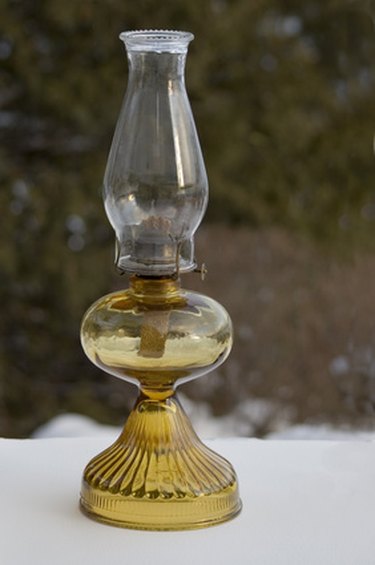
Before the invention of petroleum, people used organic oils to light their lamps. Some examples are olive oil, whale oil, beeswax and sesame oil. Petroleum fuels, such as kerosene and paraffin, tend to burn longer at a higher temperature than organic oils, but they carry certain health hazards. Fumes from kerosene or paraffin lamps can damage the lungs, and the fuel itself is toxic.
Olive Oil
Video of the Day
Olive oil is derived from pressing the seeds of the olive plant. Pure olive oil is available at most supermarkets and grocery stores. People in the Mediterranean have been using olive oil for centuries to light their lamps. As olive oil is not poisonous when ingested, it is a child-safe fuel to use for household oil lamps. Olive oil is a renewable, non-petroleum fuel that will burn in the lamp without fumes or odor.
Video of the Day
Palm Kernel Oil
During tests of the BAM Federal Institute for Materials Research and Testing, palm kernel oil proved to be the best organic, child-safe lamp alternative to low-viscosity paraffin. Unfortunately, palm kernel oil is rare because of a worldwide demand for renewable raw materials.
Canola Oil
Canola oil is derived from crushing the rapeseed. It can be used as an organic lamp fuel, but it shows poor combustion performance. Canola oil contains unsaturated compounds and tends to form a resin under light and air impact, causing the wick to clog.
Sesame Oil
Sesame oil is widely used in India for lamps lit during religious ceremonies. To the Hindus, natural lamp fuels have religious significance. The Indian people also use ghee, mustard seed oil or Castor oil for lamp fuel.
Castor Oil
Castor oil is obtained from the Castor bean, Ricinus communis. This vegetable-based oil naturally biodegrades and comes from a renewable energy source. The Egyptians fueled their lamps with Castor oil, and in India, this type of oil is still used daily. Castor oil gives a bright, white light.
Whale Oil
Whale oil works well as a lamp fuel as it lasts a long time and has a high illumination value. As many whales are endangered and protected in 2010, whale oil is no longer readily available. In the 1850s, however, whale oil was sold as a lamp fuel for between $1.30 and $2.50 per gallon.
Beeswax
Ancient Greeks used beeswax as a standard fuel for their lamps because of the long lasting, bright light it supplies. Traces of beeswax were found in lamps and conical cups from archaeological diggings in eastern Crete.